#famous modern poets
Explore tagged Tumblr posts
Text
i really want to read more poetry. if you have a favorite poet or book/collection or anything, could you recommend it in the comments or reblogs/tags?
#idc if it’s old or modern or famous or not well known#poetry#book recommendations#poetry recs#poetry reading#reading#books#poems#poets
12 notes
·
View notes
Text

T.S Eliot was a Libra. I feel that says enough.
5 notes
·
View notes
Text

Louise Glück | Poems 1962 - 2012 | excerpt from Parable Of The Dove | Meadowlands
#louise glück#poignant#poetry#prose#modern poetry#poets#female poets#famous poets#p333#parable of the dove#meadowlands#time#nature#change
13 notes
·
View notes
Text

Diane Arbus
Gerard Malanga
1966
#diane arbus#american art#modern art#american photographer#gerard malanga#malanga#arbus#andy warhol#warhol factory#the factory#poet#dancer#art#the 60s#1960s#superstar#famous#15 minutes#art photography
11 notes
·
View notes
Text
recently read the english translation and was quite pleased with the work done so my recommendation goes to A Colour Defect by Ana Maria Gonçalves
At the end of the 19th century, Kehinde, an elderly African woman, blind and almost on her deathbed, travels from Africa to Brazil in search of her son who has been missing for decades. During the crossing she tells the story of her life. Born in Savalu in 1810, Kehinde, still a child, watches as her mother is raped and killed. With her grandmother and twin sister Taiwo, she manages to escape the massacre and flees to another town. There, Kehinde and her sister are captured and put on a slave ship to Brazil. After a time, already the mother of a child she bore as the result of a rape, Kehinde manages to buy her freedom, and becomes involved with Alberto, a white man, father of her second son. Under constant watch as a freed slave, she ends up being arrested, but, with the help of friends, manages to escape from jail and leave Salvador. Some time later, she returns, only to confront the biggest tragedy of her life: Alberto, who has become an alcoholic and gambler, has sold their son to pay off a debt. From that moment on, finding her son becomes her sole goal in life, taking her to Rio de Janeiro, São Paulo and, finally, back to Africa, where new discoveries and tragedies await her. In addition to being drawn into an utterly engrossing narrative, marked by fatality, readers will discover, in impressively rich detail, little known aspects of African culture and religion in Brazil and Africa, as they accompany the saga of Kehinde, an unforgettable character, who will go down in the history of Brazilian literature. UM DEFEITO DE COR (A COLOR DEFECT) -- the name of an old law that allowed Negroes or mulattos to request that "the color defect be overlooked" when they demonstrated extreme talent, competence or will -- already has a guaranteed place among the great masterpieces of Brazilian literature.
desperately need to read or watch something that will alter my brain chemistry and turn me into a new person
#my Portela did a samba enredo based on it it was a very beautiful parade as well#the honouring of São Cosme and Damião in this in very tender for me#this doesn't mention it but Kehinde is taken from the kingdom of Daomé (modern Benin). very important reference to the role enslaved muslim#played on revolutions here but that gets very clear in the book. but she's inspired by the mother of a famous mestizo poet#long book but you truly don't notice a treasure
22K notes
·
View notes
Text
April 20, Beijing, China, National Museum of China/中国国家博物馆 (Part 1 - Dehua white porcelain exhibition/德化白瓷展):
Aaand finally, the National Museum of China/中国国家博物馆! I was lucky enough to see the famed Dehua white porcelain exhibition/德化白瓷展 here. Some of you may recognize some of these pieces already, since pictures and shorts of them have been circulating online way before I went on this trip, but there are many many other pieces too. The pieces I post here are only a small portion of the entire exhibition, so if you ever get a chance to see the exhibition elsewhere in person, don't hesitate. This stuff is amazing.
First up is one of the two that has been gaining popularity online, the piece named 神话 or "Legend".
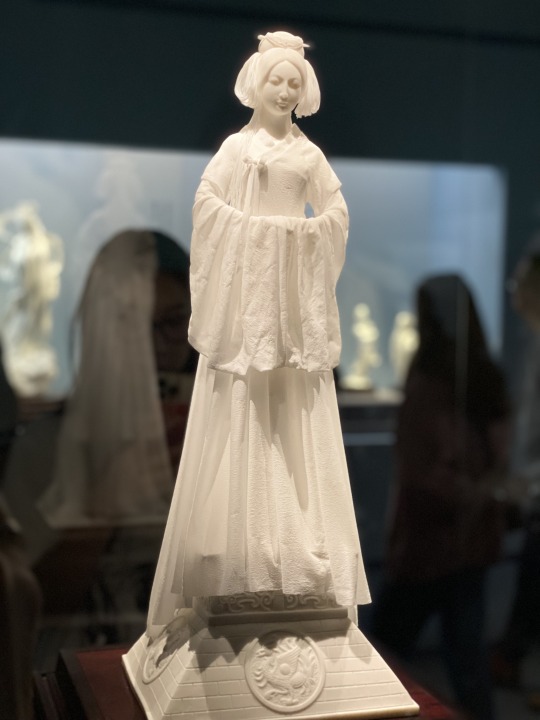
The first time I saw a porcelain piece like this, I thought that the clothing part was made with paper? But no, the light fabric of the clothing, the hair, it's all porcelain. Keep in mind when looking through these pictures: every part of every piece is porcelain.
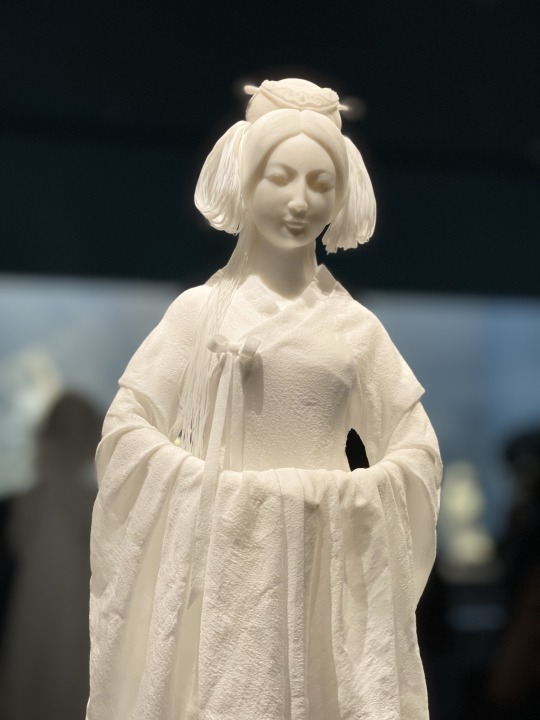
This piece is the other one that was becoming popular, the piece named simply 纸, or "Paper". If you don't look up close and see the glossy surface, you can't tell it's actually porcelain. I cannot for the life of me imagine the kind of magic that was used to turn clay into this
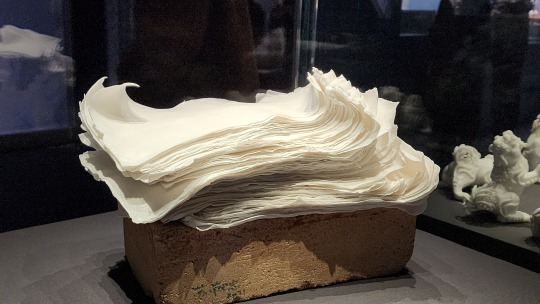
Anyway, this is a good point to introduce Dehua porcelain a little bit. Dehua porcelain is a regional specialty of Dehua/德化, which is located in Fujian province, and is known for its expressiveness and white color. For this reason it's also known in the West as "Blanc de Chine" (French: "white of China"), and this should be the reason why this exhibition is named 中国白, which basically means the same thing. The history of Dehua porcelain goes back to Song dynasty (960 - 1279), and it is still being produced today. Many of the pieces I'm posting here are modern pieces.
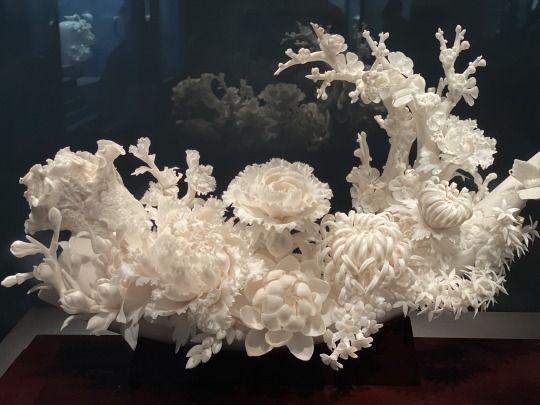
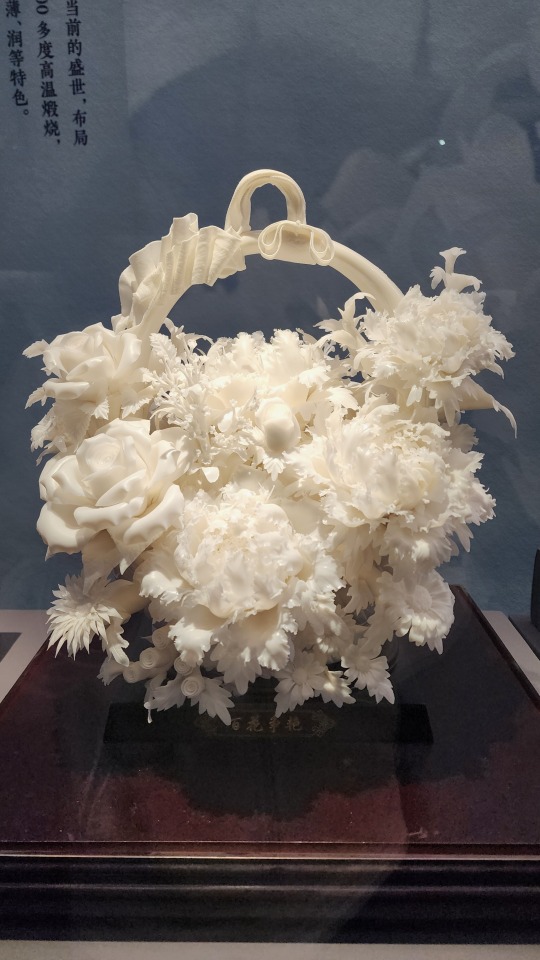
But Dehua white porcelain can be colored too (I imagine the color must be painted on later, because the white comes from the clay itself), and when it is colored, it looks like it came right out of a painting
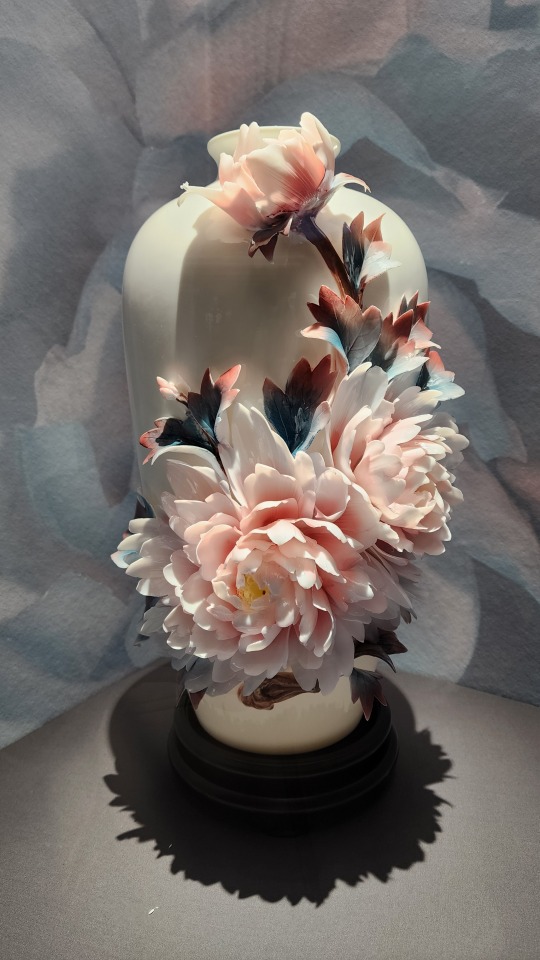
This piece is especially amazing to me. Look at the texture, look at those details. Zoom in and you will find that there are actually a bunch of porcelain ants on this porcelain tree stump. Porcelain ants. I never expected to use porcelain as an adjective when describing ants. Wtf. It's like a manifestation of a scene from an older animated movie.
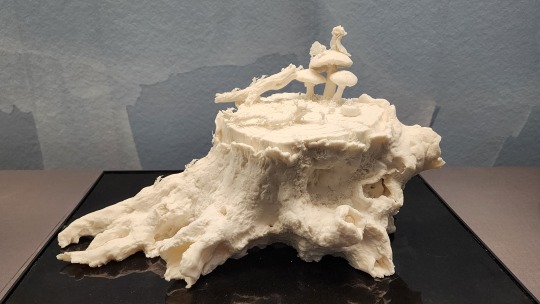
Peanuts are called 花生 in Chinese, which literally means "flower grow", and because it also has a long shelf life, it symbolizes longevity and a happy marriage. Also a fun fact: because Watson of Sherlock Holmes is usually phoenetically translated as 华生 (huá shēng) in Chinese and sounds similar to 花生 (huā shēng), you will find that many in the Chinese SH fandom refers to Watson as "peanut".
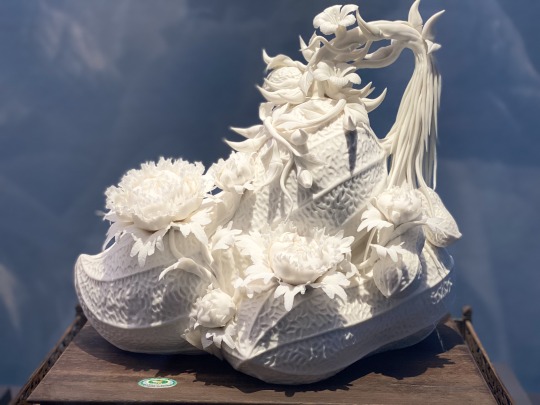
This piece is titled 春色满园, or "garden filled with spring scenery". This is also a common 4-character word used to describe gardens in spring. I'm guessing the figure depicted here is one of the flower gods. It is one of my personal favorites because of its superb depiction of movement, it's as if the flower god will really fly away on clouds at any moment
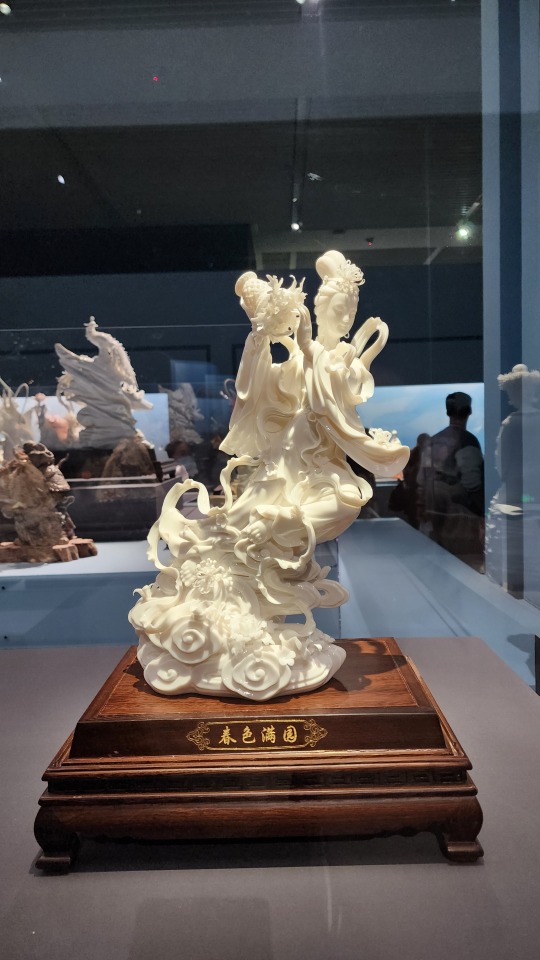
More depictions of traditional Chinese deities, specifically Chang'e/���娥, the moon goddess. That moon rabbit is too cute.
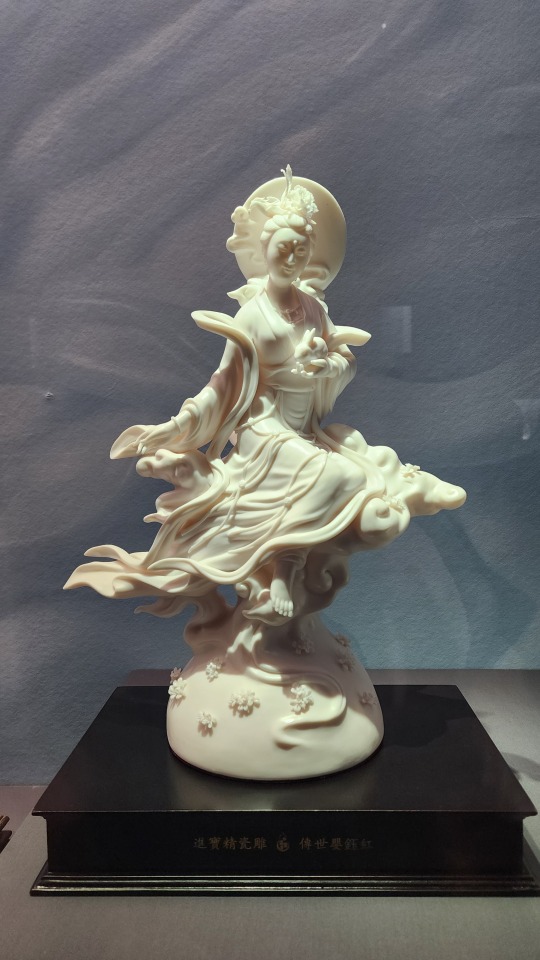
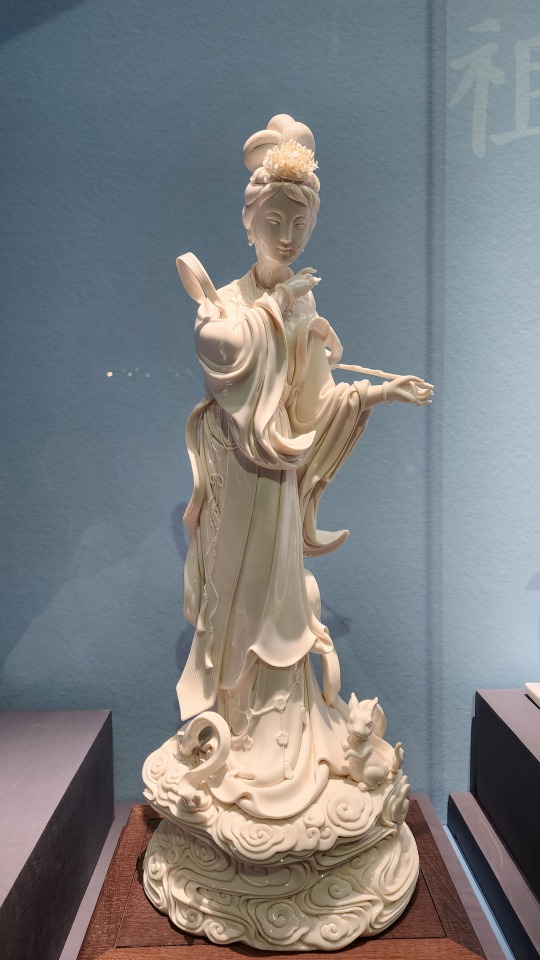
Depictions of what I'm assuming is the Four Heavenly Kings/四大天王, based on the items they are holding. The Four Heavenly Kings are Buddhist deities.
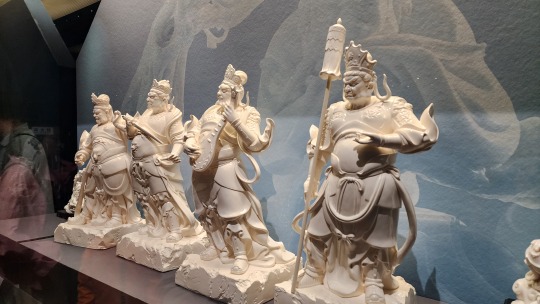
Look at her clothing! That porcelain is so thin it's almost see-through! Also is it depicting Li Qingzhao/李清照, the famous female poet from Song dynasty? She does have a famous ci poem that's about paddling a boat in a lake full of lotuses while drunk
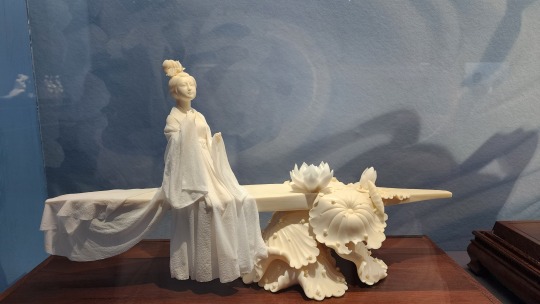
The piece titled 锦绣前程, or "future as vibrant and prosperous as silk brocade". This is also a common 4-character word used in well wishing. The figure in this piece is holding a xiuqiu/绣球, a ball made of silk, which was usually seen as a token of love
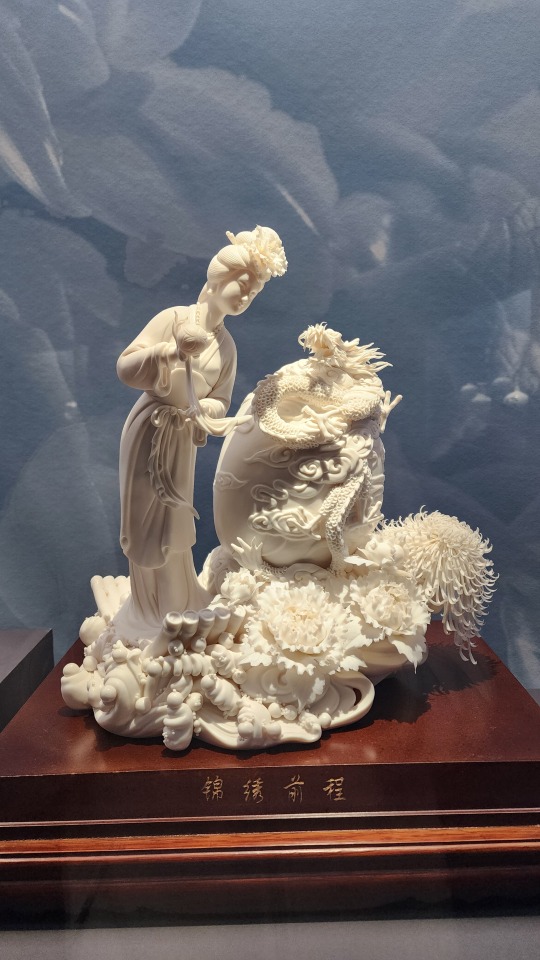
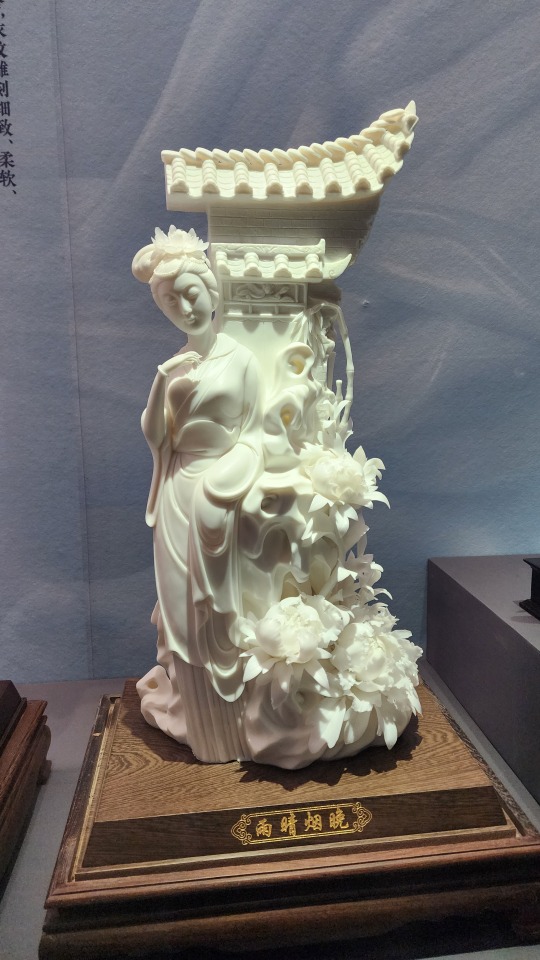
Somewhat more modern-themed pieces:
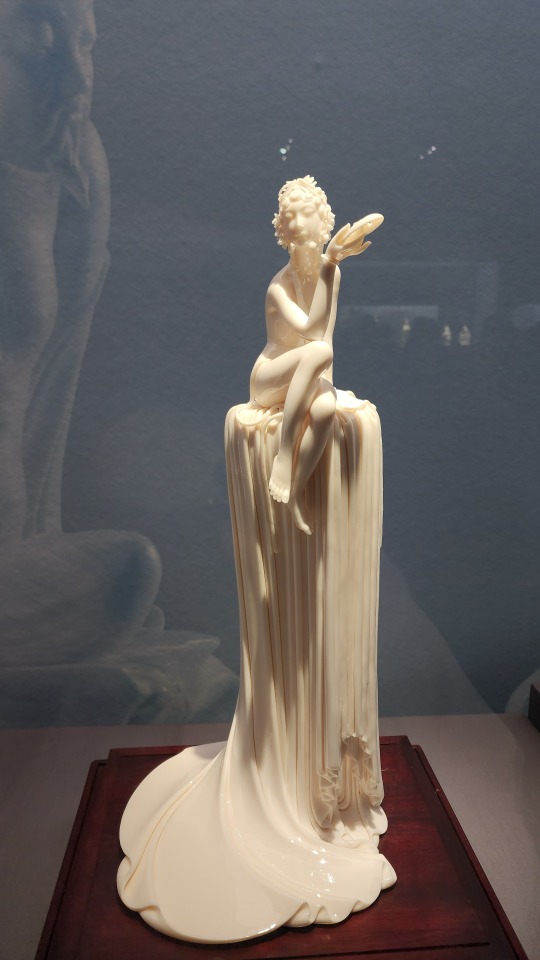
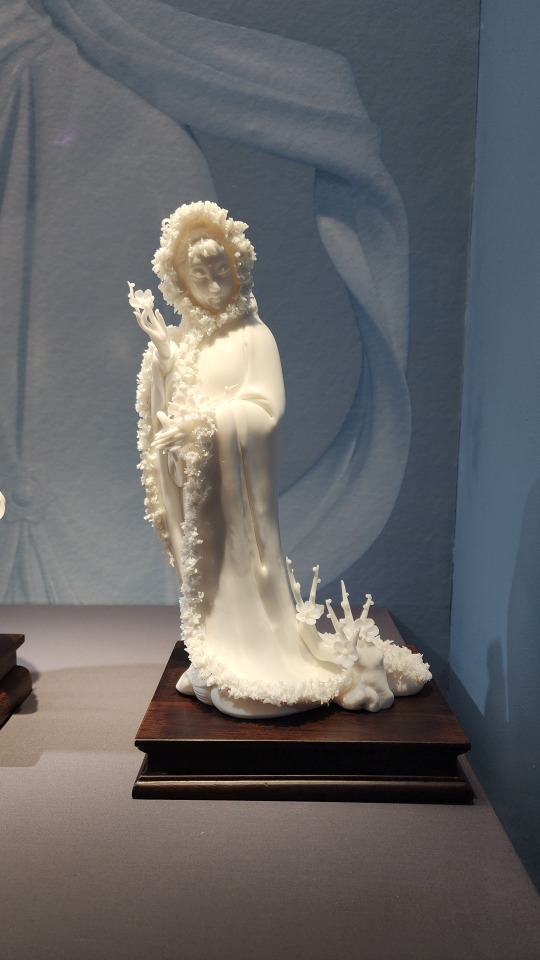
Among the hundreds of amazing pieces, this one caught my attention for its unique texture. When everyone else was trying to turn the clay into these thin sheets representing fabric or paper or flower petals, this artist took the noodle approach. Not many visitors seemed to like it, but I think it's pretty cool
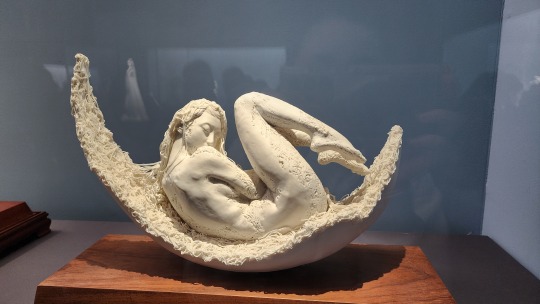
Piece titled 运势如虹, or "fortune like the rainbow", also a 4-character word used in well wishing. Traditionally horses symbolize vitality and success, hence why many people use the words 马到成功 ("horse's arrival brings success") and 龙马精神 ("vitality of dragons and horses") in well wishes during Year of the Horse
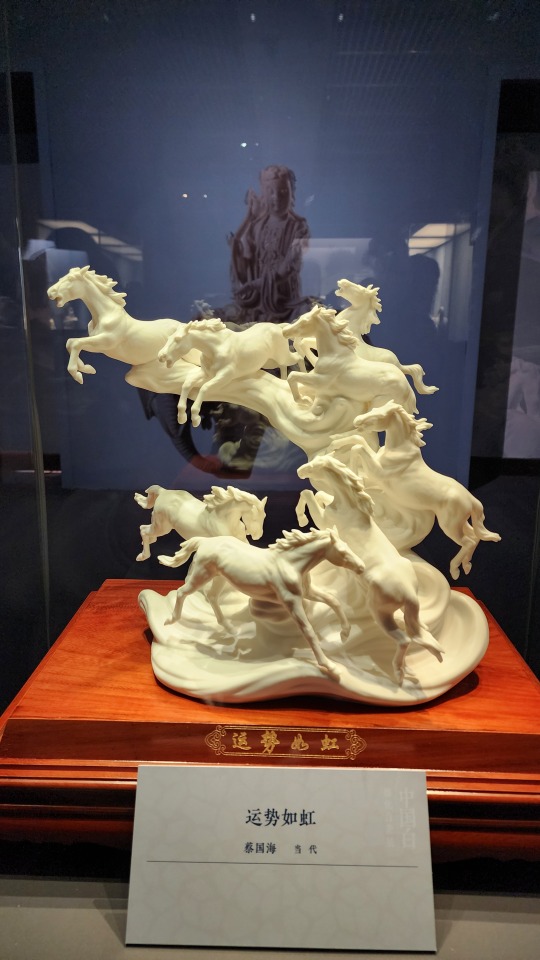
Stay tuned for Part 2 of the Dehua white porcelain exhibition!
#2024 china#beijing#china#national museum of china#dehua porcelain#blanc de chine#porcelain#chinese art#chinese culture#art#culture
3K notes
·
View notes
Text
क़ूवते लफ़्ज़
kuwate lafz akhir kanha jaanyekya Bas in panno me hi simat jaayeEhsaso ko kuch is kadar likhoRooh wa qalb me bas utar jaaye… क़ूवते लफ़्ज़ अखिर कंहा जांएक्या बस इन पन्��ों में ही सिमट जाएएहसासों को कुछ इस कदर लिखोरूह व क़ल्ब में बस उतर जाए.. “Rashid Ali Ghazipuri”

View On WordPress
#famous indian poet#indian poetry#indian poets#indian shayer#latest poets#light#love#modern poetry#new poetry#poetry#poets of india#roshni#sadness#Spiritual Poetry#time#young poets#zindagi
0 notes
Text
It bugs me that so many people's default example of published fanfic is 50 Shades of Grey.
What about West Side Story, a famous modern AU of Shakespeare's Romeo and Juliet?
What about Dante's Inferno, a self-insert RPF if I've ever seen one?
What about Wicked, a pre-canon AU of The Wizard of Oz?
Hell, what about Percy Jackson? There's definitely an argument to be made that that's a modern AU of various Greek myths.
Humans have been writing fanfic as long as they have been telling stories. In about the year 20 BC, our dear Roman poet Ovid wrote the Heroides, a series of aggrieved "letters" from the female characters of famous myths to their respective male heroes. Are you telling me that Ovid, writing a letter from the perspective of Queen Dido to Aeneas -- Aeneas, whose fantastical adventures were put into poem by Virgil -- wasn't writing an outsider-POV fic? A fic that is, in fact, translated in Latin classes world-wide today!
There is so much famous fanfic out there, but people tend to forget that it is fanfic once it becomes mainstream enough. And as a consequence of that, people who aren't into fandom don't see how beautiful fanfic is, and some members of fandom feel shame associated with writing and reading fic. But fanfic is beautiful, and it is something humans have always done, and it is nothing to be ashamed about.
So if you ever find yourself in a situation to give an example of published fic, think outside the box. Remember that published fanfics hide in plain sight; once they're famous enough, we no longer think of them as fanfic. And never forget that fanfic is a very, very old human tradition, and your ancestors who partook in it would not have wanted you to feel ashamed of it.
5K notes
·
View notes
Text
The truth about Medusa and her rape... Mythology breakdown time!
With the recent release of the Percy Jackson television series, Tumblr is bursting with mythological posts, and the apparition of Medusa the Gorgon has been the object of numerous talks throughout this website… Including more and more spreading of misinformation, and more debates about what is the “true” version of Medusa’s backstory.
Already let us make that clear: the idea that Medusa was actually “blessed” or “gifted” by Athena her petrifying gaze/snake-hair curse is to my knowledge not at all part of the Antique world. I still do not know exactly where this comes from, but I am aware of no Greek or Roman texts that talked about this – so it seems definitively a modern invention. After all, the figure of Medusa and her entire myth has been taken part, reinterpreted and modified by numerous modern women, feminist activist, feminist movements or artists engaged in the topic of women’s life and social conditions – most notably Medusa becoming the “symbol of raped women’ wrath and fury”. It is an interesting reading and a fascinating update of the ancient texts, and it is a worthy take on its own time and context – but today we are not talking about the posterity, reinvention and continuity of Medusa as a myth and a symbol. I want to clarify some points about the ACTUAL myth or legend of Medusa – the original tale, as told by the Greeks and then by the Romans.
Most specifically the question: Was Medusa raped?
Step 1: Yes, but no.
The backstory of Medusa you will find very often today, ranging from mythology manuals (vulgarization manuals of course) to Youtube videos, goes as such: Medusa was a priestess of Athena who got raped by Poseidon while in Athena’s temple, and as a result of this, Athena punished Medusa by turning her into the monstrous Gorgon.
Some will go even further claiming Athena’s “curse” wasn’t a punishment but a “gift” or blessing – and again, I don’t know where this comes from and nobody seems to be able to give me any reliable source for that, so… Let’s put this out of there.
Now this backstory – famous and popular enough to get into Riodan’s book series for example – is partially true. There are some elements here very wrong – and by wrong I do mean wrong.
The story of Medusa being raped and turned into a monster due to being raped does indeed exist, and it is the most famous and widespread of all the Medusa stories, the one people remembered for the longest time and wrote and illustrated the most about. Hence why Medusa became in the 20th century this very important cultural symbol tied to rape and the abuse of women and victim-blaming. HOWEVER – the origin of this story is Ovid’s Metamorphoses, from the first century CE or so. Ovid? A Roman poet writing for Roman people. “Metamorphoses”? One of the two fundamental works of Roman literature and one of the two main texts of Roman mythology, alongside Virgil’s Aeneid. This is a purely Roman story belonging to the Roman culture – and not the Greek one. The story of Medusa’s rape does not have Greek precedents to my knowledge, Ovid introduced the element of rape – which is no surprise given Ovid turned half of the romances of Greek mythology into rapes. Note that, on top of all this, Ovid wasn’t even writing for religious purposes, nor was his text an actual mythological effort – he wrote it with pure literary intentions at heart. It is just a piece of poetry and literature taking inspiration from the legends of the Greek world, not some sort of sacred text.
Second big point: The legend I summarized above? It isn’t even the story Ovid wrote, since there are a lot of elements that do not come from Ovid’s retelling of the story (book fourth of the Metamorphoses). For example Ovid never said Medusa was a priestess of Athena – all he said was that she was raped in the temple of Athena. I shouldn’t even be writing Athena since again, this is a Roman text: we are speaking of Minerva here, and of Neptune, not of Athena or Poseidon. Similarly, Minerva’s curse did not involve the petrifying gaze – rather all Ovid wrote about was that Minerva turned Medusa’s hair into snakes, to “punish” her because her hair were very beautiful, and it was what made her have many suitors (none of which she wanted to marry apparently), and it is also implied it is what made Neptune fall in love (or rather fall in lust) with her. I guess it is from this detail that the reading of “Athena’s curse was a gift” comes from – even though this story also clearly does victim-blaming of rape here.
But what is very fascinating is that… we are not definitively sure Neptune raped Medusa in Ovid’s retelling. For sure, the terms used by Ovid in his fourth book of Metamorphoses are clear: this was an action of violating, sexually assaulting, of soiling and corrupting, we are talking about rape. But Ovid refers several other times to Medusa in his other books, sometimes adding details the fourth-book stories does not have (the sixth book for examples evokes how Neptune turned into a bird to seduce Medusa, which is completely absent from the fourth book’s retelling of Medusa’ curse). And in all those other mentions, the terms to designate the relationship between Medusa and Neptune are more ambiguous, evoking seduction and romance rather than physical or sexual assault. (It does not help that Ovid has an habit of constantly confusing consensual and non-consensual sex in his poems, meaning that a rape in one book can turn into a romance in another, or reversal)
But the latter fact makes more sense when you recall that the rape element was invented and added by Ovid. Before, yes Poseidon and Medusa loved each other, but it was a pure romance, or at least a consensual one-night. Heck, if we go back to the oldest records of the love between Poseidon and Medusa, back in Hesiod’s Theogony, we have descriptions of the two of them laying together in a beautiful, flowery meadow – a stereotypical scene of pastoral romances – with no mention of any brutality or violence of any sort. As a result, it makes sense the original “romantic” story would still “leak” or cast a shadow over Ovid’s reinvented and slightly-confused tale.
Step 2: So… no rape?
Well, if we go by Greek texts, no, apparently Medusa was not raped in Greek mythology, and only became a rape victim through Ovid.
The Ancient Greek texts all record Poseidon and Medusa sleeping with each other and having children, but no mention of rape. And the whole “curse of Athena” thing is not present in the oldest records – no temple of Athena soiling, no angry Athena cursing a poor girl… “No curse?” you say “But then how did Medusa got turned into a Gorgon”? Answer: she did not. She was born like that.
As I said before, the oldest record of Medusa’s romance but also of her family comes from Hesiod’s Theogony (Hesiod being one of the two “founding authors” of Greek mythology, alongside Homer – Homer did wrote several times about Medusa, but only as a disembodied head and as a monster already dead, so we don’t have any information about her life). And what do we learn? That Medusa is part of a set of three sisters known as the Gorgons – because oh yes, Ovid did not mention Medusa’s sister now did he? How did Medusa’s sisters ALSO got snake-hair or petrifying-gaze if only Medusa was cursed for sleeping with Neptune? Ovid does not give us any answer because again, it is an “adaptational plot hole”, and the people that try to adapt Ovid’s story have to deal with the slight problem of Stheno and Euryale needing to share their sister’s curse despite seemingly not being involved in the whole Neptune business. Anyway, back to the Greek text.
So, you have those three Gorgon sisters, and Medusa is said to be mortal while her sisters are not. Why is it such a big deal? Because Medusa wasn’t originally some random human or priestess. Oh no! Who were the Gorgons’ parents? Phorcys and Keto/Ceto, aka two sea-gods. Not just two sea-gods – two sea-gods of the ancient, primordial generation of sea-gods, the one that predated Poseidon, and that were cousins to the Titans, the sea-gods born of Gaia mating with Pontos.
So the Gorgons were “divine” of nature – and this is why Medusa being a mortal was considered to be a MASSIVE problem and handicap for her, an abnormal thing for the daughter of two deities. But let’s dig a bit further… Who were Phorcys and Ceto? Long story short: in Greek mythology, they were considered to be sea-equivalents of Typhon and Gaia. They were the parents of many monsters and many sea-horrors: Keto/Ceto herself had her name attributed and equated with any very large creature (like whales) or any terrifying monster (like dragons) from the sea. The Gorgons themselves was a trio of monsters, but their sisters, that directly act as their double in the myth of Perseus? The Graiai – the monstrous trio of old women sharing one eye and one tooth. Hesiod also drops the fact that Ladon (the dragon that guarded the golden apples of the Hesperids), and Echidna (the snake-woman that mated with Typhon and became known as the “mother of monsters”) were also children of Phorcys and Ceto, while other authors will add other monster-related characters such as Scylla (of Charybdis and Scylla fame), the sirens, or Thoosa (the mother of Polyphemus the cyclop). Medusa herself is technically a “mother of monsters” since she birthed both Pegasus the flying horse and Chrysaor, a giant. So here is something very important to get: Medusa, and the Gorgons, were part of a family of monsters. Couple that with the absence of any mention of curses in these ancient texts, and everything is clear.
Originally Medusa was not a woman cursed to become a monster: she was born a monster, part of a group of monster siblings, birthed by monster-creating deities, and she belonged to the world of the “primordial abominations from the sea”, and the pre-Olympian threats, the remnants of the primordial chaos. It is no surprise that the Gorgons were said to live at the edge of the very known world, in the last patch of land before the end of the universe – in the most inhuman, primitive and liminal area possible. They were full-on monsters!
Now you might ask why Poseidon would sleep with a horrible monster, especially when you recall that the Greeks loved to depict the Gorgons as truly bizarre and grotesque. It wasn’t just snake-hair and petrifying gaze: they had boar tusks, and metallic claws, and bloated eyes, and a long tongue that constantly hanged down their bearded chin, and very large heads – some very old depictions even show her with a female centaur body! In fact, the ancient texts imply that it wasn’t so much the Gorgon’s gaze or eyes that had the power to turn people into stone – but that rather the Gorgon was just so hideous and so terrifying to look at people froze in terror – and then literally turned into stone out of fear and disgust. We are talking Lovecraftian level of eldritch horror here. So why would Poseidon, an Olympian god, sleep with one of these horrors? Well… If you know your Poseidon it wouldn’t surprise you too much because Poseidon had a thing for monsters. As a sort of “dark double” of Zeus, whereas Zeus fell in love with beautiful princesses and noble queens and birthed great gods and brave heroes, Poseidon was more about getting freaky with all sorts of unusual and bizarre goddesses, and giving birth to bandits and monsters. A good chunk of the villains of Greek mythology were born out of Poseidon’s loins: Polyphemus, Antaios, Orion, Charybdis, the Aloads… And even his most benevolent offspring has freaky stuff about it – Proteus the shapeshifter or Triton half-man half-fish… So yes, Poseidon sleeping with an abominable Gorgon is not so much out of character.
Step 3: The missing link
Now that we established what Medusa started out as, and what she ended up as… We need to evoke the evolution from point Hesiod to point Ovid, because while people summarized the Medusa debate as “Sea-born monster VS raped and punished woman”, there is a third element needed to understand this whole situation…
Yes Ovid did invent the rape. But he did not invent the idea that Medusa had been cursed by Athena.
The “gorgoneion” – the visual and artistic motif of the Gorgon’s head – was, as I said, a grotesque and monstrous face used to invoke fright into the enemies or to repel any vile influence or wicked spirit by the principle of “What’s the best way to repel bad stuff? Badder stuff”. Your Gorgon was your gargoyle, with all the hideous traits I described before – represented in front (unlike all the other side-portraits of gods and heroes), with the face being very large and flat, a big tongue out of a tusked-mouth, snake-hair, bulging crazy eyes, sometimes a beard or scales… Pure monster. But then… from the fifth century BCE to the second century BCE we see a slow evolution of the “gorgoneion” in art. Slowly the grotesque elements disappear, and the Gorgon’s face becomes… a regular, human face. Even more: it even becomes a pretty woman’s face! But with snakes instead of hair. As such, the idea that Medusa was a gorgeous woman who just had snakes and cursed-eyes DOES come from Ancient Greece – and existed well before Ovid wrote his rape story.
But what was the reason behind this change?
Well, we have to look at the Roman era again. Ovid’s tale of Medusa being cursed for her rape at the hands of Neptune had to rival with another record collected by a Greek author Apollodorus, or Pseudo-Apollodorus, in his Bibliotheca. In this collection of Greek myths, Apollodorus writes that indeed, Medusa was cursed by Athena to have her beautiful hair that seduced everybody be turned into snakes… But it wasn’t because of any rape or forbidden romance, no. It was just because Medusa was a very vain woman who liked to brag about her beauty and hair – and had the foolish idea of saying her hair looked better than Athena’s. (If you recall tales such as Arachne’s or the Judgement of Paris, you will know that despite Athena being wise and clever, one of her main flaws is her vanity).
“Wait a minute,” you are going to tell me, “The Bibliotheca was created in the second century CE! Well after Greece became part of the Roman Empire, and after Ovid’s Metamorphoses became a huge success! It isn’t a true Greek myth, it is just Ovid’s tale being projected here…” And people did agree for a time… Until it was discovered, in the scholias placed around the texts of Apollonios of Rhodes, that an author of the fifth century BCE named Pherecyde HAD recorded in his time a version of Medusa’s legend where she had been cursed into becoming an ugly monster as punishment for her vanity. We apparently do not have the original text of Pherecyde, but the many scholias referring to this lost piece are very clear about this. This means that the story that Apollodorus recorded isn’t a “novelty”, but rather the latest record of an older tradition going back to the fifth century BCE… THE SAME CENTURY THAT THE GORGONEION STARTED LOSING THEIR GROTESQUE, and that the face of Medusa started becoming more human in art.
[EDIT: I also forgot to add that this evolution of Medusa is also proved by strange literary elements, such as Pindar's mention in a poem of his (around 490 BCE) of "fair-cheeked Medusa". A description which seems strange given how Medusa used to be depicted as the epitome of ugliness... But that makes sense if the "cursed beauty" version of the myth had been going around at the time!]
And thus it is all connected and explained. Ovid did invent the rape yes – but he did not invent the idea of Athena cursing Medusa. It pre-existed as the most “recent” and dominating legend in Ancient Greece, having overshadowed by Ovid’s time the oldest Hesiodic records of Medusa being born a monster. So what Ovid did wasn’t completely create a new story out of nowhere, but twist the Greek traditions of Athena cursing Medusa and Medusa having a relationship with Poseidon, so that the two legends would form one and same story. And this explains in retrospect why Ovid focuses so much on describing Medusa’s beautiful hair, and why Ovid’s Minerva would think turning her hair into snake would be a “punishment fit for the crime”: these are leftovers of the Greek tale where Medusa was punished for her boasting and her vanity.
CONCLUSION
Here is the simplified chronology of how Medusa’s evolution went.
A) Primitive Greek myths, Hesiodic tradition: Born a monster out of a family of sea-monsters and monstrous immortals. Is a grotesque, gargoylesque, eldritch abomination. Athena has only an indirect conflict with her, due to being Perseus’ “fairy godmother”. Has a lovely romance with Poseidon.
B) Slow evolution throughout Classical Greece and further: Medusa becomes a beautiful, human-looking girl that was cursed to have snake for hair and petrifying eyes, instead of being a Lovecraftian horror people could not gaze upon. Her conflict with Athena becomes direct, as it is Athena that cursed her due to being offended by her vain boasting. Her punishment is for her vanity and arrogant comparison to the goddess.
C) Ovid comes in: Medusa’s romance with Poseidon becomes a rape, and she is now punished for having been raped inside Athena’s temple.
[As a final note, I want to insist upon the fact that the story of Medusa being raped is not less "worthy" than any other version of the myth. Due to its enormous popularity, how it shaped the figure of Medusa throughout the centuries, and how it still survives today and echoes current-day problems, to try to deny the valid place of this story in the world of myths and legends would be foolish. HOWEVER it is important to place back things in their context, to recognize that it is not the ONLY tale of Medusa, that it was NOT part of Greek mythology, but rather of Roman legends - and let us all always remember this time Poseidon slept with a Lovecraftian horror because my guy is kinky.]
EDIT:
For illustration, I will place here visuals showing how the Ancient art evolved alongside Medusa's story.
Before the 5th century BCE: Medusa is a full-on monster



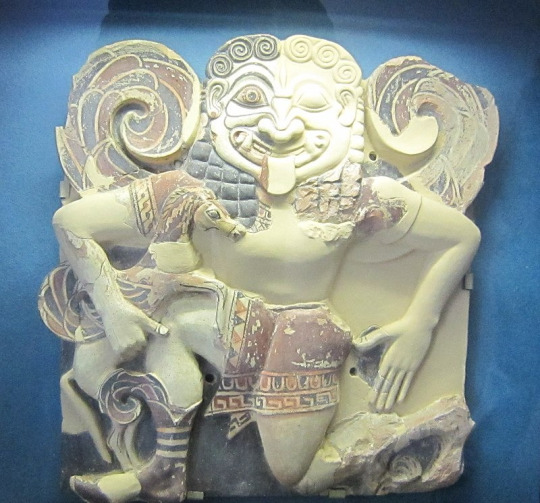


From the 5th century to the 2nd century BCE: A slow evolution as Medusa goes from a full-on monster to a human turned into a monster. As a result the two depictions of the grotesque and beautiful gorgoneion coexist.
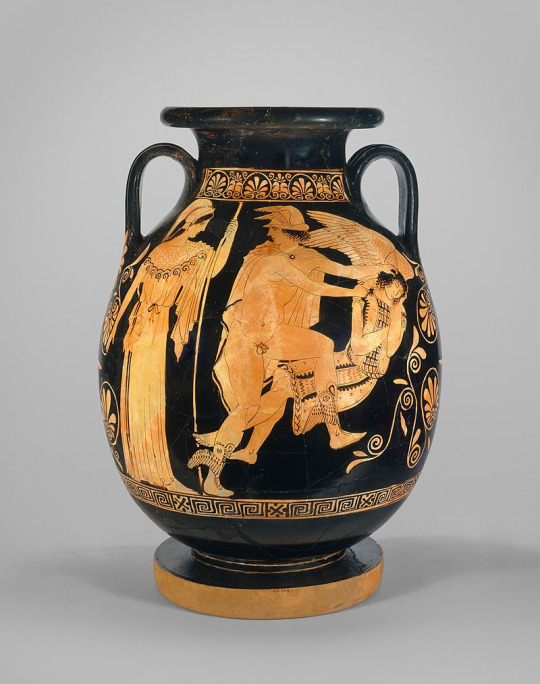


Post 2nd century BCE: Medusa is now a human with snake hair, and just that


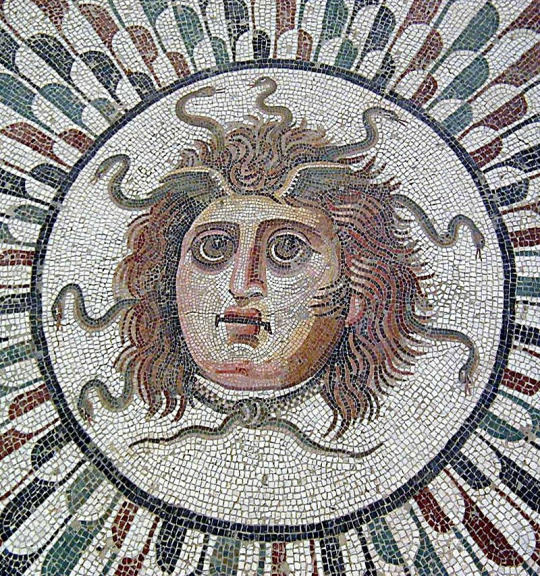
#greek mythology#medusa#gorgon#athena#gorgons#poseidon#neptune#minerva#ovid#rape in mythology#greek monsters#roman mythology
4K notes
·
View notes
Note
j, what are your thoughts on some of the other popular cats on tumblr?
みんなちがって みんないい なのです
かねこみすゞさんなのです
Everyone is different and everyone is good, by Misuzu Kaneko one of the famous and popular poets in modern Japan
602 notes
·
View notes
Text
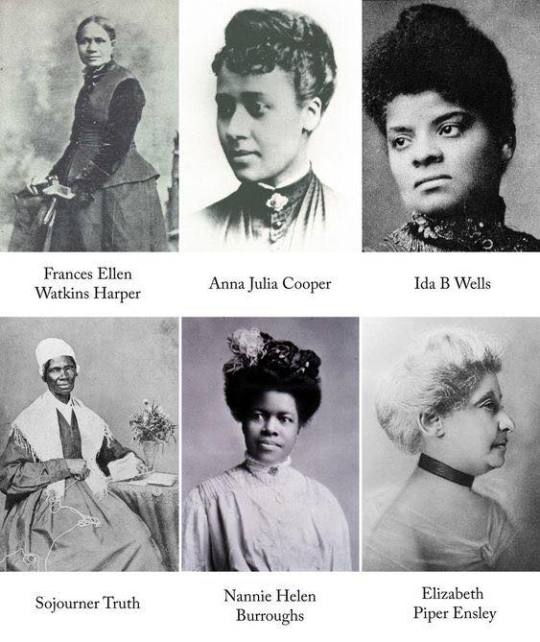
A Historical Deep Dive into the Founders of Black Womanism & Modern Feminism
Six African American Suffragettes Mainstream History Tried to Forget
These amazing Black American women each advanced the principles of modern feminism and Black womanism by insisting on an intersectional approach to activism. They understood that the struggles of race and gender were intertwined, and that the liberation of Black women was essential. Their writings, speeches, and actions have continued to inspire movements addressing systemic inequities, while affirming the voices of marginalized women who have shaped society. Through their amazing work, they have expanded the scope of womanism and intersectional feminism to include racial justice, making it more inclusive and transformative.
Anna Julia Cooper (1858–1964)
Quote: “The cause of freedom is not the cause of a race or a sect, a party or a class—it is the cause of humankind, the very birthright of humanity.”
Contribution: Anna Julia Cooper was an educator, scholar, and advocate for Black women’s empowerment. Her book A Voice from the South by a Black Woman of the South (1892) is one of the earliest articulations of Black feminist thought. She emphasized the intellectual and cultural contributions of Black women and argued that their liberation was essential to societal progress. Cooper believed education was the key to uplifting African Americans and worked tirelessly to improve opportunities for women and girls, including founding organizations for Black women’s higher education. Her work challenged both racism and sexism, laying the intellectual foundation for modern Black womanism.
Frances Ellen Watkins Harper (1825–1911)
Quote: “We are all bound together in one great bundle of humanity, and society cannot trample on the weakest and feeblest of its members without receiving the curse in its own soul.”
Contribution: Frances Ellen Watkins Harper was a poet, author, and orator whose work intertwined abolitionism, suffrage, and temperance advocacy. A prominent member of the American Equal Rights Association, she fought for universal suffrage, arguing that Black women’s voices were crucial in shaping a just society. Her 1866 speech at the National Woman’s Rights Convention emphasized the need for solidarity among marginalized groups, highlighting the racial disparities within the feminist movement. Harper’s writings, including her novel Iola Leroy, offered early depictions of Black womanhood and resilience, paving the way for Black feminist literature and thought.
Ida B. Wells (1862–1931)
Quote: “The way to right wrongs is to turn the light of truth upon them.”
Contribution: Ida B. Wells was a fearless journalist, educator, and anti-lynching activist who co-founded the National Association for the Advancement of Colored People (NAACP). Her investigative reporting exposed the widespread violence and racism faced by African Americans, particularly lynchings. As a suffragette, Wells insisted on addressing the intersection of race and gender in the fight for women’s voting rights. At the 1913 Women’s Suffrage Parade in Washington, D.C., she famously defied instructions to march in a segregated section and joined the Illinois delegation at the front, demanding recognition for Black women in the feminist movement. Her activism laid the groundwork for modern feminisms inclusion of intersectionality, emphasizing the dual oppressions faced by Black women.
Sojourner Truth (1797–1883)
Quote: “Ain’t I a Woman?”
Contribution: Born into slavery, Sojourner Truth became a powerful voice for abolition, women's rights, and racial justice after gaining her freedom. Her famous 1851 speech, "Ain’t I a Woman?" delivered at a women's rights convention in Akron, Ohio, directly challenged the exclusion of Black women from the feminist narrative. She highlighted the unique struggles of Black women, who faced both racism and sexism, calling out the hypocrisy of a movement that often-centered white women’s experiences. Truth’s legacy lies in her insistence on equality for all, inspiring future generations to confront the intersecting oppressions of race and gender in their advocacy.
Nanny Helen Burroughs (1879–1961)
Quote: “We specialize in the wholly impossible.”
Contribution: Nanny Helen Burroughs was an educator, activist, and founder of the National Training School for Women and Girls in Washington, D.C., which emphasized self-sufficiency and vocational training for African American women. She championed the "Three B's" of her educational philosophy: Bible, bath, and broom, advocating for spiritual, personal, and professional discipline. Burroughs was also a leader in the Women's Convention Auxiliary of the National Baptist Convention, where she pushed for the inclusion of women's voices in church leadership. Her dedication to empowering Black women as agents of social change influenced both the feminist and civil rights movements, promoting a vision of racial and gender equality.
Elizabeth Piper Ensley (1847–1919)
Quote: “The ballot in the hands of a woman means power added to influence.”
Contribution: Elizabeth Piper Ensley was a suffragist and civil rights activist who played a pivotal role in securing women’s suffrage in Colorado in 1893, making it one of the first states to grant women the vote. As a Black woman operating in the predominantly white suffrage movement, Ensley worked to bridge racial and class divides, emphasizing the importance of political power for marginalized groups. She was an active member of the Colorado Non-Partisan Equal Suffrage Association and focused on voter education to ensure that women, especially women of color, could fully participate in the democratic process. Ensley’s legacy highlights the importance of coalition-building in achieving systemic change.
To honor these pioneers, we must continue to amplify Black women's voices, prioritizing intersectionality, and combat systemic inequalities in race, gender, and class.
Modern black womanism and feminist activism can expand upon these little-known founders of woman's rights by continuously working on an addressing the disparities in education, healthcare, and economic opportunities for marginalized communities. Supporting Black Woman-led organizations, fostering inclusive black femme leadership, and embracing allyship will always be vital.
Additionally, when we continuously elevate their contributions in social media or multi-media art through various platforms, and academic curriculum we ensure their legacies continuously inspire future generations. By integrating their principles into feminism and advocating for collective liberation, women and feminine allies can continue their fight for justice, equity, and feminine empowerment, hand forging a society, by blood, sweat, bones and tears where all women can thrive, free from oppression.
#black femininity#womanism#womanist#intersectional feminism#intersectionality#intersectional politics#women's suffrage#suffragette#suffrage movement#suffragists#witches of color#feminist#divine feminine#black history month#black beauty#black girl magic#vintage black women#black women in history#african american history#hoodoo community#hoodoo heritage month#feminism#radical feminism#radical feminists do interact#social justice#racial justice#sexism#gender issues#toxic masculinity#patriarchy
248 notes
·
View notes
Text
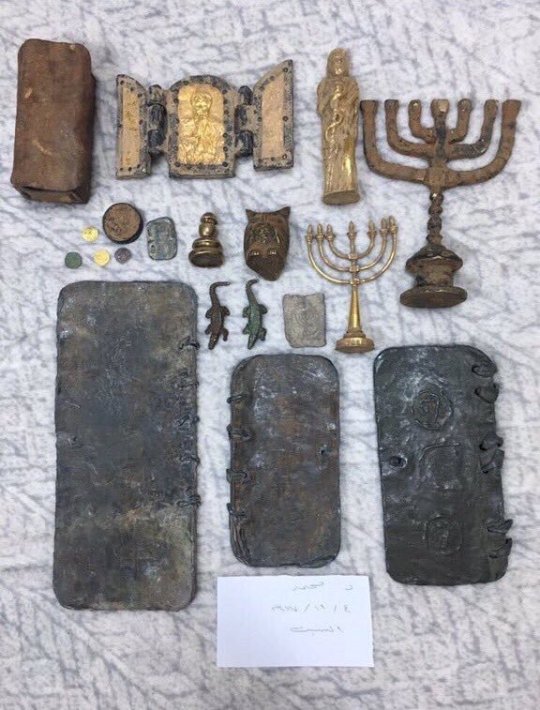
Jewish artifacts found at an excavation site in Tayma, Saudi Arabia. Tayma was a Jewish oasis during the pre-Islamic era. It was the hometown of Jewish poet Shmuel Ben Adiya, famous for his unconditional loyalty towards Prince Imru al Qais in the 6th century.
Tayma, along with Khaybar were the two most important oasis in the Hejaz region (modern Saudi Arabia) that used to have a strong jewish presence until the fall of Khaybar in 628 (4388 - 4389 in the hebrew calendar) when the first muslims conquered the fortress and expelled most of the jewish population.
#archaeology#jewisharchaeology#judaism#jewish#jewishhistory#jews#history#ancienthistory#ancient#saudiarabia#saudihistory#khaybar#tayma#artifacts#preislamic#israel#israeli
1K notes
·
View notes
Text
Writing Reference: Names for the Devil
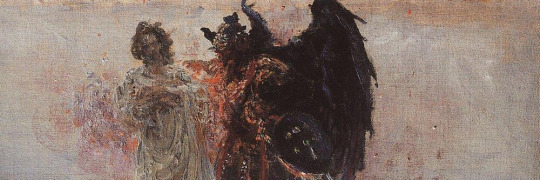
The word devil comes from the Greek diábolos, which literally means “slanderer.” The Spanish diablo and the adjectival diabolical also come from this word.
Satan
Perhaps the most well-known name for the Devil is Satan.
This name appears repeatedly in the Bible, such as in Luke 22:3 when the Devil is blamed for Judas Iscariot’s betrayal of Jesus Christ: Then entered Satan into Judas surnamed Iscariot, being of the number of the twelve.
The name Satan is recorded in English before the year 900.
The English word comes through the Greek Satán from the Hebrew word śātān meaning “adversary.”
Ash-Shaytān (Shaitan)
The Devil appears in Muslim scripture as well.
Comes from the Arabic al-Shaytān and is etymologically connected to the English Satan. The “ash” or “al” indicates that one is talking about the Devil (with a capital D) as opposed to a devil or demon.
The name Ash-Shaytān has several different variants in Arabic, including Shaytan, Shaitan, and Sheitan.
Iblis
Often used to tell the story of the origin of the Devil.
According to the Qur’an, God commanded all the spirits to bow before Adam, but a spirit named Iblis refused.
For this blasphemous act, Iblis was cast down from Heaven.
Iblis is actually a source of debate among Islamic scholars and thinkers. Some consider Iblis to be a fallen angel or archangel. Others count him as a jinn (a spirit that is lower in rank than an angel), usually the jinn that fathered all of the others.
The name Iblis comes through Arabic from the Greek diábolos, that same word that is also the origin of the word devil.
Lucifer
Often a source of debate among Biblical scholars.
In the Bible, the story of a fallen angel is mentioned in Ezekiel 28 and Isaiah 14.
According to the Bible, this angel became so vain and proud that he thought himself above God. As punishment for his wickedness, the angel was cast out of Heaven and into the dark pit of the Earth so that he would be even lower than humanity. In translations of the Bible, such as the King James Version, this angel’s name is said to be Lucifer.
The Bible does not say that this angel Lucifer is the same being as Satan. That connection was popularized by poet John Milton in his famous epic poem Paradise Lost (1667), which tells the story of the fallen angel Lucifer becoming Satan after a failed rebellion against God during a War in Heaven.
Paradise Lost is so popular that its depiction of Satan still heavily influences modern depictions of the Devil and the lore many people associate with him.
The name Lucifer comes from Latin and means “morning star” or can be literally translated as “light bringing.”
In classic mythology, Lucifer was the name of the planet Venus, which was personified as a man holding a torch.
Prince of Darkness
This name for the Devil appeared in Paradise Lost, as well as William Shakespeare’s King Lear (1606).
In the Bible, God is often associated with light, while the Devil, the opposing force, is often associated with darkness.
The Devil has turned away from God’s light and embraced the darkness of sin.
Prince of Darkness, then, accurately describes the Devil’s role as the ruler of the darkest darkness that is the pits of hell.
A few other names for the Devil, such as the Lord of Darkness or the Dark Lord, similarly give the Devil a diabolical-sounding title.
The Serpent
Largely based on Genesis 3, wherein Eve is tempted by a talking snake to eat the forbidden fruit. Although the Bible doesn’t explicitly say so, popular biblical interpretation is that this serpent was actually the Devil.
This belief that the lying snake was the Devil was the reason behind his many other duplicitous names, such as the Deceiver, the Tempter, or the Father of Lies.
The Devil seems to enjoy taking the form of nefarious lizards, as he is said to take the form of a gigantic dragon in the Book of Revelation. This explains another of his reptilian nicknames, the Dragon.
Old Nick
An informal nickname for the Devil that has been used since the 1600s.
Although there are many theories where this name came from, nobody can say for certain. This one is surprising given that Old Saint Nick (or Nicholas) is a commonly used nickname for Santa Claus, who is about as far away from the Devil as you can get.
Interestingly, though, there is a bit of a connection between these two in the form of Krampus, a terrifying goat-demon creature who, according to European legend, emerges during Christmastime to beat naughty children or bring them to hell.
The Devil’s age inspired a few other nicknames, such as Old Scratch and Old Harry, which also focus on his long lifespan.
Belial
In the Bible, the name Belial is used to directly refer to the Devil in 2 Corinthians when it is used to contrast the Devil as being the evil to Jesus’s good.
Used throughout the Old Testament to describe wicked or sinful people as being men, children, and sons/daughters of Belial, meaning that they have turned away from God and serve the Devil.
Comes from the Hebrew bəliyyaʿal and is equivalent to a combination of the words bəlī (without) and yaʿal (worth).
Used in the Bible to say that a person embodies wickedness and is therefore “worthless” in the sense that they only take from others by performing evil deeds.
Beelzebub
Used to refer to the Devil himself or another devil that serves under him.
Appears in the New Testament in the Gospels of Luke, Matthew, and Mark.
According to the Bible, some onlookers accused Jesus of having the power to exorcise demons because he serves Beelzebub, who is said to be “the chief of devils.” Jesus assures the people that his power comes from God and not Satan.
Comes from the Hebrew bá`al zebūb, which literally translates to “lord of flies.”
In popular culture, Beelzebub is often depicted as a horrifying fly demon when he is considered to be a separate being from the Devil.
Apollyon
Mentioned in Revelation 9:11 and is used to refer to a king of demons.
The Bible names Apollyon as “the angel of the bottomless pit” and states the name Apollyon is the Greek name for the being known in Hebrew as Abaddon.
Common interpretation of this passage says that Apollyon is Satan or a powerful demon that serves him.
As the Bible hints at, the name Apollyon comes from the Greek apollýōn, which is a participle of the verb apollýnai meaning “to destroy.”
The name Abaddon comes from the Hebrew ăbhaddōnōn, which means “destruction.”
Whoever Apollyon/Abaddon is, they are also often referred to as the Destroyer.
Mammon
Appears in the Gospels of Luke and Matthew when recounting one of Jesus’s sermons. Jesus uses this term to refer to the wicked greed and desire for wealth. He states that it is impossible to serve both God and mammon.
As time went on, writers would interpret this passage to mean that Jesus was talking about a demonic entity named Mammon that embodied wealth and obsessive greed.
Comes from the Aramaic māmōnā, which means “riches” or “wealth.”
Legion
The name of a demon or a group of demons that Jesus encounters in the Gospels of Luke and Mark. Jesus asks a demon who is possessing a man their name and receives the famous answer of “My name is Legion: for we are many.”
The name Legion comes from the Latin legiōn, which refers to a body of soldiers.
Ancient Rome was famous for its legions (of soldiers) that made it a dominant military power.
Azazel
Used in translations of the scapegoat ritual as mentioned in Leviticus 16.
According to the account of the ritual, a goat would be offered to God and a second goat bearing the sins of the people would be offered to Azazel.
This being known as Azazel is also referred to as “the scapegoat.”
Interpretations of this passage would suggest that Azazel was some kind of demonic entity, possibly even the Devil himself.
Mephistopheles
Comes from the German legends of Faust.
In the legends, Faust is bored with life and pleads to the Devil to give him knowledge and pleasure. Happy to oblige, a demon named Mephistopheles appears before Faust. Depending on the story, this Mephistopheles is either the Devil himself or a devil who works for him.
Either way, Faust makes a deal with the Devil and gets the sinful pleasure he wants in exchange for his soul and an eternity in hell.
The Antichrist
Only briefly mentioned in the Bible in First and Second Epistles of John as some kind of being that is acting in opposition to Jesus.
However, the role of the Antichrist would be expanded on in other Biblical texts and by many Christian writers.
In most versions, the Antichrist is imagined as an unholy opposite to Jesus Christ; the Antichrist is a being that will bring sin and damnation to mankind.
It is said that the arrival of the Antichrist will signal the end of the world.
In modern depictions, the Antichrist is frequently imagined as the son of Satan, mirroring how Jesus is the son of God.
More Devils and Demons
While Satan is the Devil, he doesn’t rule alone in his fiery pit of hell.
He has many devils that work under him, gleefully spreading evil and corrupting humanity. More words used to describe these infernal denizens of hell:
devil
demon
fiend
imp
succubus
incubus
jinn
The Devil is often said to have many lesser demons that help him rule over hell. The names of these were catalogued in the Dictionnaire Infernal (1818).
Some interesting names include Belphegor, Lamia, Astaroth, and Garuda.
Source ⚜ More: Notes ⚜ References for Poets ⚜ Writing Resources PDFs
#writing reference#writeblr#literature#dark academia#writers on tumblr#creative writing#langblr#words#spilled ink#writing prompt#linguistics#light academia#writing inspiration#writing ideas#ilya repin#writing resources
191 notes
·
View notes
Text
my boy only breaks his favourite toys

pairing : charles leclerc x reader
fandom : f1
series : the tortured poets department
warnings : angst baby angst, no comfort here.
a/n : this broke my heart a little but oh well.

oh here we go again...
The late afternoon sun filtered through the large windows of the Monaco apartment, casting a golden hue over the modern, embellished living room. You and Charles stood in the kitchen, a simmering tension between you.
"You know how important this event is to me, Charles," you said, your voice steady but with an edge of frustration. "I've been looking forward to it for weeks."
Charles sighed, running a hand through his tousled hair. "I know, and I'm sorry, but you know how demanding the F1 schedule is. I have commitments I can't get out of."
You crossed your arms, your eyes narrowing slightly. "Oh, here we go again," you muttered, more to yourself than to him. "Every time I have something important, it's always the same excuse."
Charles's eyes flashed with a mixture of guilt and frustration. "It's not an excuse, Y/N. This is my job. It's what I've worked for my entire life."
"And what about what I've worked for?" you shot back, your voice rising. "This event is a big deal for me, and it feels like you don't even care."
Charles stepped closer, his expression softening as he reached out to touch your arm. "That's not fair. I do care, deeply. But I can't just drop everything because our schedules clash."
You pulled away, taking a deep breath to steady yourself. "It feels like your career always comes first, Charles. I need you to be there for me too, just once."
He sighed, frustration giving way to a deep sadness in his eyes. "I want to be there for you, but I don't know how to balance everything."
You looked at him, your eyes filled with unshed tears. "Maybe it's time you figure out how, because I can't keep doing this. I need to know I'm important to you too."
Charles's face hardened slightly, a storm brewing in his eyes. "This again? You think I don't know how important you are? I can't be in two places at once, Y/N."
Your voice shook with emotion as you replied, "I'm not asking you to be perfect, Charles. I'm asking you to make an effort."
His frustration boiled over, his tone sharp. "I am making an effort! But you can't expect me to be there for every single event when I'm fighting for my career."
Your tears finally spilled over, your voice breaking. "I'm not asking for every single event. I'm asking for this one. But it seems like that's too much to ask."
Charles stared at you, his jaw clenched, before he turned away abruptly. "I can't do this right now," he muttered, grabbing his jacket from the back of a chair.
"Where are you going?" you asked, your voice trembling.
"Out," he said curtly, not looking back as he headed for the door. "I need some air."
The door slammed behind him, leaving you standing alone in the quiet apartment, the echo of your argument hanging heavy in the air. You sank onto the couch, wrapping your arms around yourself, feeling a cold emptiness settle in your chest. The silence was deafening, and for the first time, you wondered if your love could withstand the strain of your clashing worlds.

rivulets descend my plastic smile...
The grand ballroom of the FIA Gala was adorned with sparkling lights and elegant decorations, a fitting venue for the prestigious event. You arrived on Charles's arm, feeling a mix of excitement and nerves. As a famous singer, you were set to perform a song later in the evening, and the anticipation was palpable.
Charles looked dashing in his tailored suit, and he squeezed your hand reassuringly as you made your way through the crowd, greeting fellow drivers and attendees. You couldn't help but notice the pride in his eyes as he introduced you to his colleagues, but a small part of you hoped that pride would extend to your performance later.
As the evening progressed, you were called to the stage. The crowd applauded as you took your place at the microphone, the spotlight shining brightly on you. The music started, and you poured your heart into the song, your voice resonating through the grand hall.
But as you sang, your eyes scanned the audience, searching for Charles. When you found him, your heart sank. He wasn't watching your performance. Instead, he was at the bar, engrossed in conversation with a group of people, a drink in hand. He didn't even glance in your direction.
You fought to keep your composure, finishing the song with as much passion as you could muster. The crowd erupted in applause, but the hurt gnawed at you. As you stepped off the stage, Lewis Hamilton, Carlos Sainz, Alex Albon, and Pierre Gasly approached you, their expressions a mix of admiration and concern.
"That was incredible, Y/N," Lewis said, giving you a warm hug.
"Seriously, you were amazing," Carlos added, his smile genuine.
Alex and Pierre echoed their sentiments, but there was an undercurrent of awkwardness.
"We're sorry about Charles," Pierre said quietly, glancing towards the bar. "He should have been watching you."
You forced a smile, gratitude for their support mingling with the sting of Charles's neglect. "Thank you, guys. It means a lot."
After exchanging a few more pleasantries, you excused yourself, needing a moment to collect your thoughts. You made your way to the bathroom, the weight of the evening pressing down on you. Once inside, you locked the door behind you and leaned against the sink, the tears you'd been holding back finally spilling over.
The sound of the bustling gala outside was muted here, leaving you alone with your thoughts and your pain. You couldn't understand why Charles couldn't be there for you, why he couldn't even watch you perform for just a few minutes. The hurt and frustration were overwhelming, and you let yourself cry, the tears a cathartic release.
As you stood there, you wondered if this was something you could continue to endure. Being with someone who couldn't support you in the moments that mattered most was taking its toll. For now, though, you just needed to let the tears fall, hoping that somehow, things might get better.

but you should have seen him when he first saw me...
The apartment in Monaco was filled with the echoes of another heated argument. You were standing in the middle of the living room, tears streaming down your face, your voice rising with each word.
"Why can't you understand, Charles? I need you to be there for me! It's always about your career, your races, your commitments! This is the grammy's! the most important awards night ever! Why can't you make time for me?!" You screamed, the frustration and pain evident in every syllable.
Charles stood across from you, his face a mixture of anger and helplessness. "I do understand, Y/N, but you know how important my career is! I can't just drop everything whenever you need me!"
Your hands trembled as you wiped away the tears. "You should have seen you when you first saw me," you cried, your voice breaking. "You looked at me like I was the most important person in the world. Where did that go, Charles?"
The memory hit Charles like a punch to the gut, sending him back to the first time he saw you. It was at the Monza Grand Prix. He had just finished his race, the adrenaline still pumping through his veins, when he saw you standing near the paddock. You were talking animatedly with a friend, your smile lighting up the entire area.
Charles had stopped in his tracks, his breath catching in his throat. He remembered how his teammates teased him about looking like a lovestruck puppy, but he couldn't help it. You were captivating, and he had been instantly drawn to you.
In the present, he struggled to reconcile that moment with the reality of the argument unfolding before him. "I remember," he said quietly, his voice filled with regret. "I remember how I felt when I first saw you. But things have changed, Y/N. The demands of my career... it's not easy."
"Things have changed because you let them," you shouted, the pain in your voice cutting through him. "You let your career come between us. You promised you'd be there for me, but you're never there when I need you."
Charles took a step towards you, reaching out, but you recoiled. "Don't, Charles. I'm tired of empty promises."
He dropped his hand, feeling the weight of your words. "I don't want to lose you," he said softly, his voice breaking.
"Then start showing it," you whispered, your tears flowing freely. "Because right now, I feel like I'm losing you."
The silence that followed was heavy, filled with the unspoken fears and regrets that had been building between you. Charles stood there, torn between his love for you and the relentless demands of his career. And you, feeling the ache of his absence even when he was right in front of you, wondered if things would ever go back to how they once were.
Finally, unable to bear the silence any longer, Charles turned and left the apartment, the door closing softly behind him. You sank to the floor, the tears coming harder now, the memories of better times a bittersweet reminder of what you had lost.

he saw forever so he smashed it up..
The soft glow of the bedside lamp cast a warm light over the room as you and Charles lay entwined under the covers, the quiet hum of the city outside barely audible. His arms were wrapped around you, his heartbeat a comforting rhythm against your back. It was one of those rare, peaceful moments when everything felt just right.
You turned slightly to face him, your head resting on his chest. "Charles," you began softly, tracing patterns on his skin with your fingertips, "do you ever think about our future? Like, where we might be in a few years?"
Charles's hand stilled on your back, and you felt his body tense slightly. The question hung in the air, and a heavy silence settled over the room. You waited, expecting him to respond with his usual confident assurance, but instead, there was only hesitance.
"Charles?" you prompted, your voice quieter now, a hint of uncertainty creeping in.
He shifted slightly, looking away as if searching for the right words. "I... I don't know, Y/N," he finally said, his voice barely above a whisper.
The silence that followed felt deafening. You tried to hide the sinking feeling in your chest, forcing a small smile as you looked up at him. "It's okay," you said, attempting to sound light-hearted. "We don't have to figure it all out right now."
But the emptiness inside you grew, a hollow ache that his words had planted there. You cuddled closer, burying your face in his chest, hoping the warmth of his embrace could fill the void. Yet, the unspoken truth lingered, a shadow over the moment of intimacy.
Charles held you tighter, as if trying to reassure both you and himself. But the hesitation in his response, the uncertainty in his eyes, left you feeling more alone than ever. You had wanted a glimpse of a shared future, a promise of what could be, but instead, you were left with doubts and questions.
As you lay there in his arms, you couldn't shake the feeling of loss, the odd emptiness that settled over you. The love you shared was real, but the future you hoped for seemed suddenly fragile, like a dream that might slip away at any moment.

ill tell you that he runs because he loves me...
The lively buzz of conversation filled the upscale restaurant as you sat with Charles and a group of fellow F1 drivers—Lewis Hamilton, Carlos Sainz, Pierre Gasly, and Alex Albon. The evening had started well, laughter and camaraderie flowing easily around the table.
Charles had been in good spirits, joking and sharing stories, but after the main course, he excused himself to go to the bathroom. At first, you thought nothing of it, but as the minutes ticked by, the knot of anxiety in your stomach grew tighter.
Carlos glanced at you, his brow furrowing slightly. "Everything okay, Y/N?" he asked, his voice gentle.
You forced a smile, trying to appear unconcerned. "Yeah, he just went to the bathroom. He'll be back soon."
The conversation continued, but your eyes kept darting toward the hallway, hoping to see Charles returning. After what felt like an eternity, the worry and embarrassment began to creep in. You knew the other drivers were aware of the growing tension.
Lewis leaned closer, his expression kind but concerned. "Do you want to go check on him?"
You shook your head, swallowing hard. "No, it's fine. He runs because he loves me," you joked, trying to keep your voice steady. "He just needs a moment."
The table fell into an awkward silence. You could see the sympathy in their eyes, a silent acknowledgment that they understood more than they were letting on. It stung, their pity, but you held your head high, determined not to let your emotions show.
Pierre reached over, giving your hand a gentle squeeze. "We know he loves you, Y/N," he said softly.
Alex nodded in agreement, though his eyes mirrored the concern you felt. "Sometimes it’s just hard to see someone we care about struggle."
You nodded, biting your lip to keep the tears at bay. "Thanks, guys. I appreciate it."
Just as you began to lose hope, Charles finally reappeared, looking slightly disheveled but smiling as if nothing had happened. He slid back into his seat beside you, wrapping an arm around your shoulders. "Sorry, I took so long," he said lightly. "I got caught up talking to someone."
You nodded, leaning into him, though your heart ached with the knowledge that something was off. The rest of the evening passed in a blur, the camaraderie tainted by the lingering unease.
As you all said your goodbyes and headed home, you couldn't shake the feeling of emptiness. Charles held your hand, but the connection felt fragile, like a thread that might snap at any moment. The sympathy in the other drivers' eyes haunted you, a reminder that love alone might not be enough to bridge the growing distance between you.

he took me out my box...
The dim light of your bedroom lamp cast a soft glow over your face as you lay on your bed, your phone propped up on the pillow. Charles’s familiar features filled the screen, but there was a distance in his eyes that you couldn’t ignore. The nighttime quiet amplified the unspoken tension between you as you spoke quietly over FaceTime.
“So, how was your day?” you asked, trying to keep the conversation light.
Charles smiled, but it didn’t reach his eyes. “Busy, as usual. Lots of meetings and prep work for the next race.”
You nodded, offering a small smile in return. “I miss you. It feels like we haven’t really talked in ages.”
He glanced away for a moment, his attention seemingly captured by something offscreen. “Yeah, I miss you too,” he said absently, his focus clearly elsewhere.
The silence stretched, and you couldn’t help but feel a pang of sadness. You studied his face, searching for the spark that had once been so evident. Your mind drifted back to a time when things were different, when his love had been your anchor.
It was a little over a year ago, at a time when you were at your lowest. The world seemed bleak, and you had felt utterly lost. Charles had been there, though, in a way you never expected. He spent every day by your side, offering comfort and support. He made you laugh when all you wanted to do was cry, held you close when you felt like falling apart. It was during those dark days that he had fallen for you, his love a beacon of hope that guided you through the storm.
You remembered the gentle way he would look at you, as if you were the most precious thing in the world. He would bring you your favorite tea, sit with you in silence when words were too much, and remind you every day of your worth and strength. It was those moments that made you fall in love with him, his unwavering presence and the way he seemed to understand your pain.
“Do you remember when we first started dating?” you asked softly, breaking the silence.
Charles’s eyes flickered back to you, a hint of confusion in his expression. “Of course I do,” he replied. “Why do you ask?”
You hesitated, trying to find the right words. “I was just thinking about how much you were there for me when I was going through a tough time. You spent your days looking after me, making sure I was okay. It meant the world to me.”
His face softened slightly, a small sigh escaping his lips. “Yeah, I remember. You needed someone, and I wanted to be that person for you.”
Your heart ached at his words, knowing how far things had drifted. “I needed you then, and I still need you now, Charles. I miss how close we used to be.”
He looked at you, the conflict evident in his eyes. “I’m still here, Y/N. Things are just... different now.”
The emptiness you had been trying to ignore settled heavily in your chest. “I know. It just feels like we’re growing apart, and I don’t know how to fix it.”
Charles remained silent, his gaze dropping to the floor. The connection that had once been so strong now felt fragile and tenuous.
“I love you, Charles,” you whispered, hoping to bridge the gap between you.
He looked back up at you, his expression weary. “I love you too, Y/N. I really do.”
But as the call ended and the screen went dark, you couldn’t shake the feeling of loss that lingered. The memories of better times clashed with the present reality, leaving you with a deep sense of longing for the man who had once been your everything.

im queen, of sand castles he destroys...
The tension in the air was suffocating as you and Charles stood locked in a heated argument, words flying like arrows, each one piercing deeper than the last. His face was contorted with anger, his fists clenched at his sides, and in a moment of blind rage, he reached out and grabbed the grammy award from the shelf.
"No, Charles, don't!" you cried out, but it was too late. With a violent motion, he hurled the award to the ground, the sound of shattering glass filling the room.
You gasped, the shock of his actions leaving you momentarily speechless. Tears stung your eyes as you stared at the broken pieces of your prized possession, a symbol of your hard work and dedication. Anger surged through you, hot and fierce, but it was quickly replaced by a cold, numbing emptiness.
"You... you destroyed it," you whispered, your voice barely above a whisper.
Charles's chest heaved with exertion, his eyes blazing with a mixture of fury and regret. "I don't care," he spat out, his voice dripping with venom. "I'm sick of pretending like everything's fine when it's not. I can't stand being with you anymore."
The weight of his words crashed down on you like a tidal wave, leaving you reeling in disbelief. He had shattered more than just an award; he had shattered your trust, your love, everything you had built together.
Without a word, you turned away from him, your heart heavy with grief and betrayal. You couldn't bear to look at him any longer, couldn't bear to see the man you had once loved reduced to this. With trembling hands, you reached for your phone, dialing a number you never thought you'd have to call.
"Hello?" a voice answered on the other end.
"Mom," you choked out, tears streaming down your face. "Can you come over? I need you."
As you hung up the phone, you felt Charles's eyes boring into your back, but you refused to turn around. The damage had been done, irreparable and irreversible. And as you heard him storm out of the room, you knew that this was the end.

when I fix me, he's gonna miss me...
The stage was set, the crowd buzzing with anticipation as you stood under the bright lights, microphone in hand. Your heart raced with nervous excitement, knowing that tonight would be a turning point in your career. As the music swelled and the spotlight found you, you took a deep breath and began to speak.
"Thank you all for being here tonight," you said, your voice steady despite the butterflies in your stomach. "I have some exciting news to share with you all."
The audience leaned in, hanging on your every word as you made the announcement they had been waiting for. "I'm thrilled to announce that I'll be releasing a new album," you declared, a smile spreading across your face as cheers erupted from the crowd. "And not only that, but I'll be dropping the lead single tonight."
As the excitement built to a crescendo, you couldn't help but feel a surge of satisfaction. This was your moment, your chance to take control of your narrative and reclaim your power. With a sense of purpose, you raised the microphone to your lips once more.
"The lead single is titled 'My Boy Only Breaks His Favorite Toys'," you announced, your voice ringing out clear and strong. "And to the boy who broke all his favorite toys and my fucking heart, this is one big fuck you from me to you."
The words hung in the air, charged with emotion and defiance. There was a collective gasp from the audience, followed by a thunderous applause that seemed to shake the rafters. In that moment, you knew you had struck a chord, tapping into a universal truth that resonated with people far and wide.
As you launched into the song, pouring your heart and soul into every word, you felt a sense of liberation wash over you. This was your anthem, your battle cry, and you sang it with a fierce intensity that left no doubt in anyone's mind that you were taking back control of your life.
And when the performance went viral, spreading like wildfire across social media and capturing the hearts of millions, you knew that you had made the right choice. You had turned your pain into power, your heartbreak into art, and in doing so, you had found a strength within yourself that you never knew existed.

a/n : thanks for reading! as always comments likes reblogs feedback etc is always appreciated 🤍
TAGS
ttpd series - @ateezseonghwanot @khaylin27 @imgondeletedis @jj-ever-lovely-jewel @stylestastic
general - @roslastyles420 @hopefulinlove @bluesongbird-blog
f1 : @ivegotparticulartaste @moon-enthusiast @superlegend216 @theonly1outof-a-billion
charles : - @chanshintien @eternalharry @janeholt3 @magicalcowboyarbiter @oneafterdark @leclerc13 @moon-enthusiast @crlsummer @superlegend216 @electrobutterfly @formula1mount @f1lov3r @livsters @inkfablesandstories @ssararuffoni
TO BE ADDED TO THE TAGLIST SEND ME AN ASK OR A DM SPECIFYING WHICH FANDOM 🤍
#charles leclerc#charles leclerc x reader#charles leclerc x you#charles leclerc imagines#charles leclerc imagine#f1#formula 1#f1 imagines#f1 imagine#cl#cl16#cl16 x reader#lewis hamilton#charles lechair#charles leclerc x female reader#charles leclerc x female oc#f1 drivers x reader#taylor swift#the tortured poets department
432 notes
·
View notes
Text
it’s pretty ironic how much anti-zionists quote Emma Lazarus
“None of us are free until all of us are free!” Like yes girl that quote is generally accredited to Emma Lazarus, who was a Zionist and ALSO was speaking about Jewish refugees fleeing antisemitic violence in Russia
Anyways Emma Lazarus is my favorite poet so here’s some facts about her while I wait in an airport for my flight to take off
She was descended from Sephardic Jews who fled the inquisition and settled in the Americas in the 1600s
Most of her poems revolved around Jewish themes
She wrote the famous poem at the base of the Statue of Liberty, “The New Colossus”
She volunteered with the Hebrew Immigrant Aid Society helping Jewish refugees from Russia get settled in the US
She was a Zionist over a decade before the modern Zionist movement was founded, and advocated for the creation of a Jewish homeland in Eretz Yisrael and wrote essays against antisemitism
And here is a passage from my favorite Emma Lazarus poem, “In Exile”
Strange faces theirs, wherethrough the Orient sun / Gleams from the eyes and glows athwart the skin. / Grave lines of studious thought and purpose run / From curl-crowned forehead to dark-bearded chin. / And over all the seal is stamped thereon/ Of anguish branded by a world of sin, / In fire and blood through ages on their name, / Their seal of glory and the Gentiles' shame.
Freedom to love the law that Moses brought,/ To sing the songs of David, and to think / The thoughts Gabirol to Spinoza taught, / Freedom to dig the common earth, to drink / The universal air—for this they sought / Refuge o'er wave and continent, to link / Egypt with Texas in their mystic chain, / And truth's perpetual lamp forbid to wane.
If you want to read more here is an article I can recommend you: https://www.womenshistory.org/education-resources/biographies/emma-lazarus
#jumblr#jewish#chana talks#judaism#israel#am yisrael chai#i stand with israel#antisemitism#anti zionism#antizionism is antisemitism#emma lazarus#the new colossus#yes this post was motivated by Chappell roan
396 notes
·
View notes
Text
Here’s my impression of what book Grantaire would sound like in the modern day, as he posts incoherent “media analysis/philosophy/traumadumping” video content on his YouTube channel:
"Aren't memes a form of modern dadaism? 'I can haz cheesburger" edits are relics of history, as is the work of Duchamp. Duchamp made that famous urinal. Perhaps memes are but the urinal of the human race. All of art is but humanity’s sewage, our waste. But can sewage be fertilizer? There was a waste treatment scandal in the early 1980s, when a sewage company did not properly clean the water, and people became sick. Many of our rivers are unclean because of corporations polluting them. Chicago has creeks that are still bubbling with the remnants of the old slaughterhouses. Carl Sandburg wrote a poem where he is achingly horny for the city of Chicago, and its hog-butchers: "Come and show me another city with lifted head singing so proud to be alive and coarse and strong and cunning." That poet’s love for his anthropomorphic city was never requited; he was disdained by his deity, which could not love him, being mostly smog and steel. But his poem is now a meme for its homoeroticism. Thus all art is coarse pollution, sewage, wastewater, memes!"
#les mis#Grantaire#i posted this in the Les mis letters server when we were talking about Grantaire#and a buddy sugggested posting it on tumblr
221 notes
·
View notes